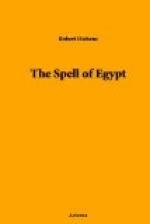That base and that summit—what suggestion and what mystery in their contrast! What sober, eternal beauty in the dark line which unites them, now sharply, yet softly, defined against the night, which is purple as the one garment of the fellah! That line leads the soul irresistibly from earth to the stars.
III
SAKKARA
It was the “Little Christmas” of the Egyptians as I rode to Sakkara, after seeing a wonderful feat, the ascent and descent of the second Pyramid in nineteen minutes by a young Bedouin called Mohammed Ali who very seriously informed me that the only Roumi who had ever reached the top was an “American gentlemens” called Mark Twain, on his first visit to Egypt. On his second visit, Ali said, Mr. Twain had a bad foot, and declared he could not be bothered with the second Pyramid. He had been up and down without a guide; he had disturbed the jackal which lives near its summit, and which I saw running in the sunshine as Ali drew near its lair, and he was satisfied to rest on his immortal laurels. To the Bedouins of the Pyramids Mark Twain’s world-wide celebrity is owing to one fact alone: he is the only Roumi who has climbed the second Pyramid. That is why his name is known to every one.
It was the “Little Christmas,” and from the villages in the plain the Egyptians came pouring out to visit their dead in the desert cemeteries as I passed by to visit the dead in the tombs far off on the horizon. Women, swathed in black, gathered in groups and jumped monotonously up and down, to the accompaniment of stained hands clapping, and strange and weary songs. Tiny children blew furiously into tin trumpets, emitting sounds that were terribly European. Men strode seriously by, or stood in knots among the graves, talking vivaciously of the things of this life. As the sun rose higher in the heavens, this visit to the dead became a carnival of the living. Laughter and shrill cries of merriment betokened the resignation of the mourners. The sand-dunes were black with running figures, racing, leaping, chasing one another, rolling over and over in the warm and golden grains. Some sat among the graves and ate. Some sang. Some danced. I saw no one praying, after the sun was up. The Great Pyramid of Ghizeh was transformed in this morning hour, and gleamed like a marble mountain, or like the hill covered with salt at El-Outaya, in Algeria. As we went on it sank down into the sands, until at last I could see only a small section with its top,




